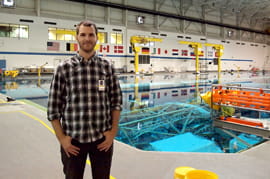Bridging the Gap Between Computer Science and Social Impact

It’s rare to meet a computer scientist who enjoys staff meetings almost as much as his technical work, said Michael Brennan, a computer science Ph.D. candidate. But much to his own surprise, he said, he’s one of them.
“I have found I love talking to people and understanding these issues, figuring them out and coming together as a team,” said Brennan, who recently completed a part-time gig as a technologist for privacy and identity protection at the Federal Trade Commission while still studying at Drexel.
At the FTC, Brennan acted as an adviser to the staff charged with protecting the privacy of consumers in the United States from unfair and deceptive practices.
“I wasn’t doing any programming, but [I] was doing a lot of educating,” Brennan said. “I worked hand-in-hand with lawyers who used my expertise in computer science to help them understand most cases.”
“My favorite days were the ones that were full of meetings with lawyers and company [representatives] and other officials,” Brennan added. “I knew I was doing something right if I was meeting with people all day and thinking, ‘I’m happy.’”
Since first pursuing his Ph.D. at Drexel, Brennan—who originally worked as a software developer after completing his undergraduate degree in computer vision at the University of Delaware—said he found his interests evolving to how computer science directly impacts the lives of people.
“I had a hard time figuring that out,” Brennan said. “When I came to grad school at Drexel, I found really quickly that my interests had changed and [computer vision] wasn’t exactly in line with my personal passions. I had to [ask myself], ‘Where do my skills fit in tangible social impact in human challenges?’”
Brennan said his research interests began to click for him when he began working with Dr. Rachel Greenstadt, an assistant professor of computer science.
“She was very supportive of this idea—that computer science can affect society in a particular way,” Brennan said. “I see it as all part of the same path now. Using browsers, using computers—it has an actual impact on everyday people.”
Brennan’s passion for the intersection of computer science and social impact has drawn him to put his expertise to use for the organization Random Hacks of Kindness, “an event and competition combining technology with disaster relief, social development, climate change and human rights to create immediately applicable solutions to real-world problems.”
“Seeing the excitement and energy [at the Random Hacks of Kindness] events has made me think, ‘This is me. I’m on the right path here,’ ” said Brennan, who leads the Philadelphia chapter of the organization.
The corporate leaders of the company have since asked him to help organize “Random Hacks” on a global level—a task he will continue after he defends his dissertation at Drexel in the fall.
“I really love my work, and I’m fortunate that this job is giving me the best of both worlds,” Brennan said. “It’s given me a lot of opportunity to travel the world. This year I’ve traveled to Australia, San Francisco, Costa Rica. But I chose to come to Drexel because of its strong program in an area I love—Philadelphia—and this is the area I want to stay.”
Drexel News is produced by
University Marketing and Communications.